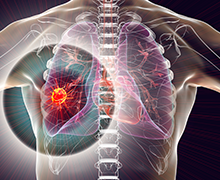Target Audience
The educational design of this activity addresses the needs of oncology, interventional radiology, oncology pharmacy, and pathology clinicians (MDs, PAs, NPs, and nurses) involved in the treatment of patients with non-small cell lung cancer (NSCLC).
Program Description
Lung cancer is the second most common cancer in both men and women and is the leading cause of cancer-related deaths. The majority of lung cancer cases are categorized as NSCLC, which has a low overall 5-year survival rate, especially when it is diagnosed at advanced, unresectable stages. Recent advances in the treatment landscape have yielded promising improvements in progression-free survival and overall survival; however, outcomes are dependent on numerous factors, including the evaluation of mutational status and prompt implementation of targeted therapeutic strategies. This 4-part CME Snapshot activity has been designed to educate and promote critical thinking through a discussion-based format, with elements of 3D animation. Multidisciplinary expert faculty discuss the appropriate molecular testing techniques to evaluate mutational status and provide practical recommendations for individualized treatment strategies in unresectable EGFR+ NSCLC based on their clinical experience and the latest published clinical evidence.
Educational Objectives
After completing this activity, the participant should be better able to:
- Evaluate mutational status in patients with NSCLC using appropriate molecular testing techniques
- Describe the pathophysiology and clinical implications of EGFR mutations in NSCLC
- Discuss the efficacy, safety, and mechanisms of action of EGFR-targeting therapies for patients with NSCLC
- Construct evidence-based therapeutic regimens of EGFR-targeting medications for NSCLC across treatment settings


Molecular Classification of NSCLC


An Overview of EGFR-Targeting Agents


Treatment Approaches for EGFR+ NSCLC


Overcoming Treatment Challenges in EGFR+ NSCLC







